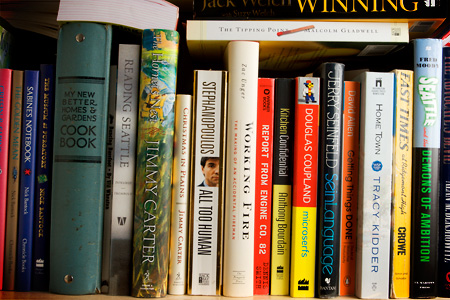 Sean Harding/blog
Sean Harding/blog
They said no one ever died in a blogging accident, but based on the numbers I’m seeing, it’s suddenly become much more common…
I may not post to my blog much, but I read a lot of blogs. In that sense, I could probably be called a blog addict. Thankfully, Google Reader makes managing a long list of blogs somewhat easy. Easier, at least, than the alternatives.
As adept as I am at following blogs, there are some I can never keep up with. And I just have to ask why? Why does posting dozens of items a day seem like a good idea? What reader wants that kind of volume? Not I. The biggest offenders in my list are the Gawker sites. Valleywag: 19 posts today. Defamer: 21 posts. Lifehacker: 23. Consumerist: 31 posts in the last ten hours. Three posts a freakin’ hour, all day long!!! Even if those were the only four blogs I read (as if), I’d have nearly a hundred posts to read/skim/ignore. And of course Gawker refuses to put the full post in their RSS feeds, regularly forcing me to click through to their site to even see if the article is of interest. Thanks, guys.

I suppose they’re hoping to drive up page views, ad revenue, etc. But I think that in the long run, they’re at risk of doing the exact opposite. Because their sites are so noisy, so filled with fluff, so infrequently posting something I actually care about, I’ve all but given up on reading them. I have the Gawker sites in their own folder in Reader, and I tend to just give them a cursory skim every few days. Sometimes I go a week or more without looking at them. If they could control themselves and provide a nice, tightly-edited blog with a few quality postings a day, I’d be a regular reader. Oh well. Their loss…
It’s that time of year again! We’ve sent off our holiday cards, and now I’m sharing it with all of you via the miracle that is the Internet. Enjoy!



You probably won’t be surprised to hear that I’m an early adopter. I like to try out new products and technology, and I’m used to products having some rough edges. But sometimes, the edges are so annoyingly rough that I just have to share my frustration. You, dear reader, are the lucky recipient.
About this time two years ago, I was at Target shopping for some new outdoor Christmas lights, and I saw some really cool looking blue LED icicle lights from Philips. They cost far more than the old fashioned kind of lights, but they looked neat and I’m a sucker for new products. Also, the box claimed that they offer “up to 88% energy savings” and “25,000 hour average bulb life,” so I figured they’d last a long time. I bought three sets, put them up, and I liked them so much that I bought another set last year.
This year when I tested them before hanging them (a crucial step), I discovered that three of the four sets were malfunctioning. Including the new set purchased just last year. On two sets, only half of the lights worked, and on the third, none worked at all. After some testing and inspection, I discovered what you see in the photo below.

That’s right. Rust! Apparently, the wires on the LEDs are steel, so they rust when they get wet. Really great design for lights that are meant to be used outdoors, huh? All four strings have severe rusting. It’s worst on the lights at the bottom of the “icicles,” presumably because that’s where the water runs to when it rains. It turns out, this is a known problem. But it wasn’t known to me when I bought the lights, and it may very well not be known to you. Until now, of course. You’re welcome.
This year, I’ll be using good old incandescent Christmas lights outside.
John Gruber thinks Kindle will flop. His main points revolve around DRM and closed formats — common hotbutton issues with tech bloggers. I don’t often disagree with Gruber, but in this case I think he’s missed the mark. Or, at the very least, I think he arrived at the conclusion via incorrect assumptions.
Gruber makes analogies to music and video formats, but he doesn’t account for an important difference between the way many people use books and the way people use music and video. When I buy music, whether it be on CD, iTunes, Amazon.com MP3 or anywhere else, I want to be able to listen to it over and over and over for a long time. When I buy a book, I tend to read it once, maybe refer to it a few times over the next few weeks or so, and then let it sit and take up space on my shelf for the rest of my life.

It certainly could be argued that this isn’t the most logical thing to do. If I want to read a book only once, borrowing from the public library seems like a great choice. However, the selection isn’t as good as Amazon’s, and it’s far less convenient. I should sell or give away books when I’m done with them, but again it comes down to the convenience factor — finding someone who wants to take a bunch of random books can be harder than you’d think. And of course I could throw them out, but that just seems wrong. So I’m stuck with boxes and stacks of books I’ve already read, and I know I’m not the only person in this situation.
From that perspective, Kindle is very attractive because the books take up no space and require no effort to get rid of when I’m done with them. Further, given the way I use books, I don’t give a damn if I can’t read them three years later. I wouldn’t even be terribly annoyed if I couldn’t read a book a month after I’d finished it. That’s a total non-issue to me. I’m not building a library (well, I am, but not intentionally). I’m reading books once and storing them because I’m too lazy to figure out what else to do with them.
All that said, I’m not planning to buy a Kindle at this point. The convenience is tempting, but I don’t think it’s worth $400 to me. I’m also not totally sold on the idea that an electronic device could replace the experience of reading a paper book. I think those are the things that will have a big impact on Kindle’s fate. DRM will certainly be a factor for some people, but on the list of things that determine Kindle’s success, it’s nowhere near the top.
Disclaimer: Though I’m a former Amazon.com employee, I never worked on anything even remotely related to Kindle, and I don’t have any insider information about it. If you’re looking for inside scoop, you’ve come to the wrong guy!